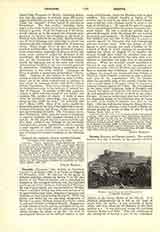

Cesarini, GIULIANO (also known as CARDINAL JULIAN), b. at Rome, 1398; d. at Varna, in Bulgaria, November 10, 1444. He was one of the group of brilliant cardinals created by Martin V on the conclusion of the Western Schism, and is described by Bossuet as the strongest bulwark that the Catholics could oppose to the Greeks in the Council of Florence. He was of good family and was educated at Perugia, where he studied Roman law with such success as to be appointed lecturer there, Domenico Capranica and Nicholas of Cuss being among his pupils. When the schism was ended by the universal recognition of Martin V as pope, Giuliano returned to Rome, where he attached himself to Cardinal Branda. Suggestions of wide reform were rife, and the principles of the outward unity of the Church and its reformation from within became the ideals of his life. In 1419 he accompanied Branda on his difficult mission to Germany and Bohemia, where the Hussites were in open rebellion. The cardinal thought so highly of his services that he used to say that, if the whole Church were to fall into ruin, Giuliano would be equal to the task of rebuilding it. He had all the gifts of a great ruler, commanding intellectual powers, and great personal charm. He was a profound scholar and a devoted Humanist, while his private life was marked by sanctity and austerity. In 1426 Martin V created him cardinal and sent him to Germany to preach a crusade against the reformers who were committing grievous excesses there. After the failure of this appeal to arms Cesarini was made President of the Council of Basle in which capacity he successfully resisted the efforts of Eugene IV to dissolve the council, though later (1437) he withdrew from the opposition, when he perceived that they were more anxious to humiliate the pope than to accomplish reforms. When the reunited council assembled at Ferrara he was made head of the commission appointed to confer with the Hussites and succeeded at least in winning their confidence. In 1439, owing to a plague, the council was transferred from Ferrara to Florence, where Cesarini continued to play a prominent part in the negotiations with the Greeks. After the successful issue of the council, Cesarini was sent as papal legate to Hungary (1443) to promote a national crusade against the Turks. He was opposed to the peace which Ladislaus, King of Hungary and Poland, had signed at Szegedin with Sultan Amurath II, and persuaded the former to break it and renew the war. It was an unfortunate step and resulted in the disastrous defeat of the Christian army at Varna in 1444, when Cardinal Giuliano was slain in his flight. His two well-known letters to Eneas Sylvius about the pope’s relations to the Council of Basle are printed among the works of Pius II (Pii II Opera Omnia, Basle 1551, p. 64).
EDWIN BURTON

